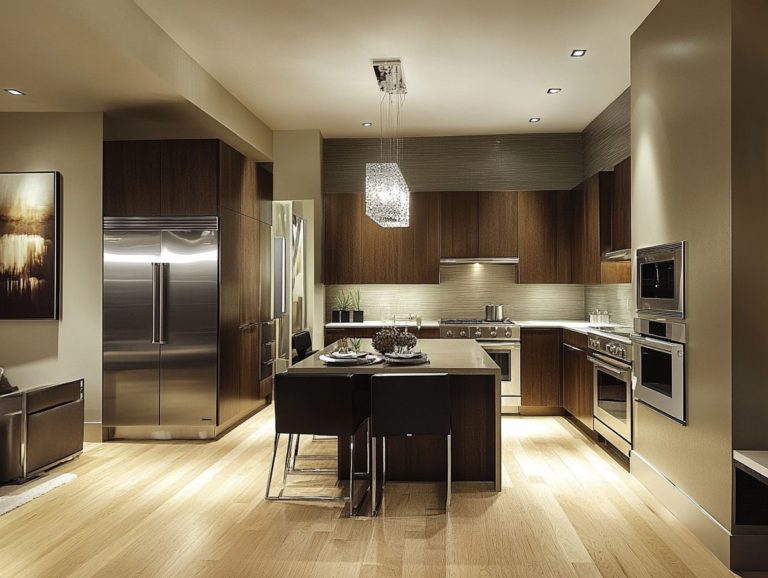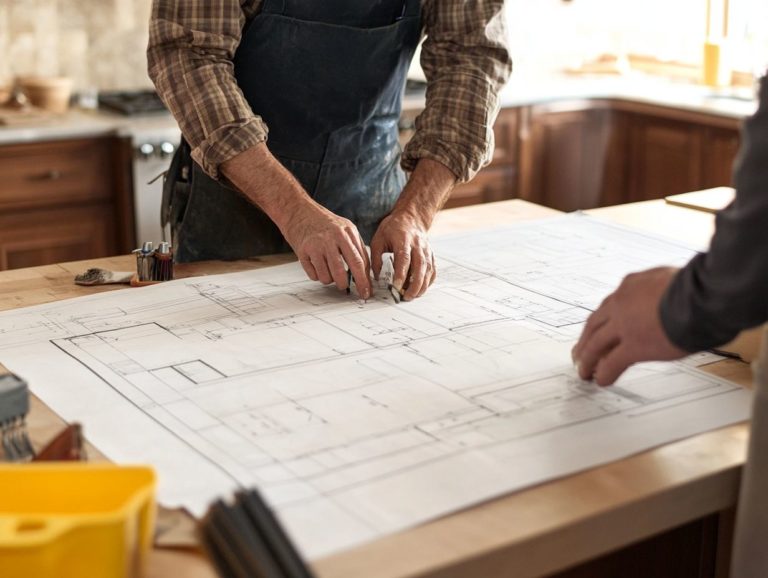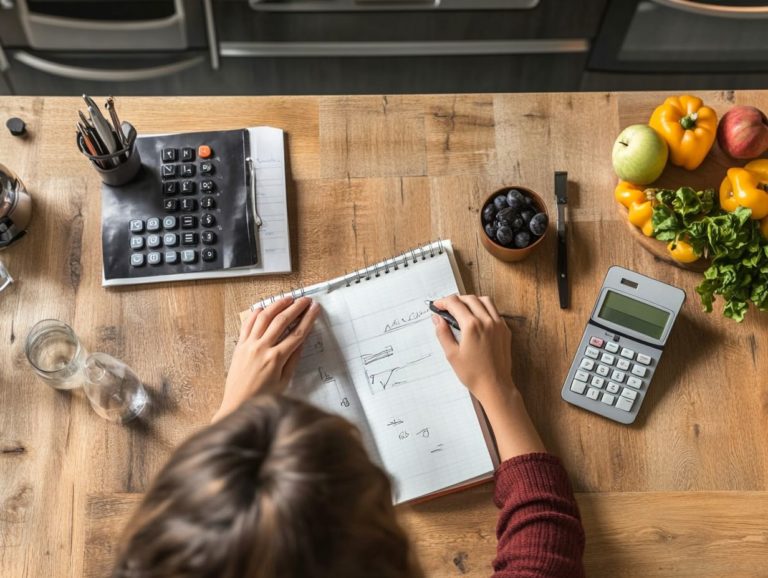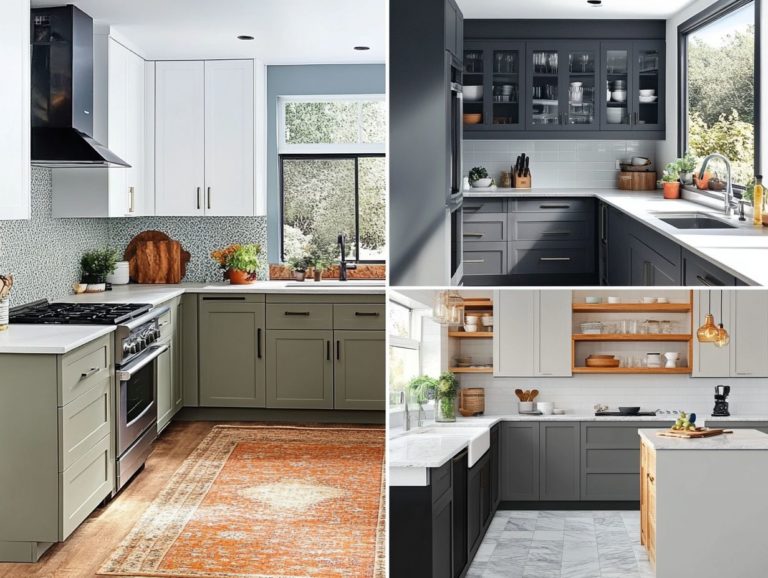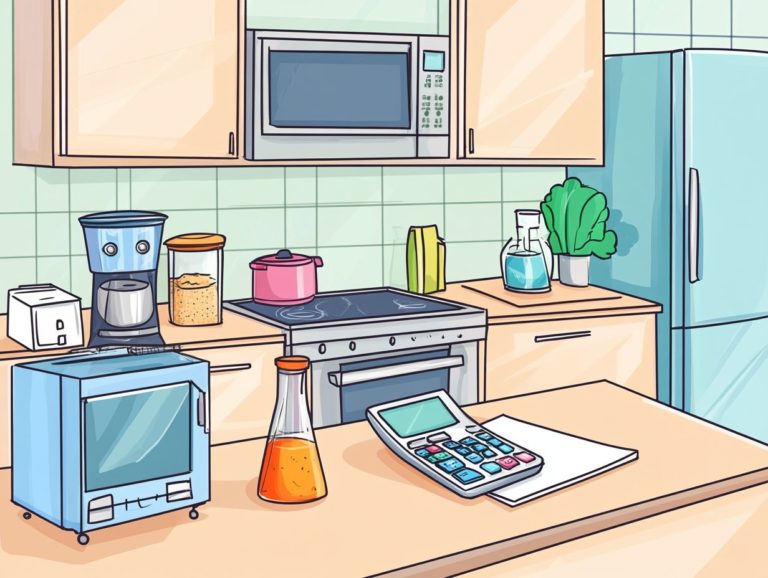Budgeting Essentials for Kitchen Design Projects
Planning a kitchen redesign can feel overwhelming, especially when budgeting comes into play. Understanding how to allocate your resources is essential. This allows you to create your dream kitchen without financial strain.
In this article, you’ll discover the importance of budgeting in kitchen design. You’ll also find key factors to consider and strategies to help you maximize your budget.
From assessing your needs to managing unexpected expenses, you’ll find practical tips that empower you to navigate your kitchen renovation with confidence.
Contents
- Key Takeaways:
- Master Your Kitchen Design Budget!
- Key Factors to Consider in Budgeting
- Creating a Realistic Budget
- Maximizing Your Budget
- Dealing with Unexpected Expenses
- Finalizing Your Budget
- Frequently Asked Questions
- What are the key budgeting essentials for kitchen design projects?
- How can I set a realistic budget for my kitchen design project?
- Why is it important to prioritize my needs and wants when budgeting for a kitchen design project?
- How can I research the costs of materials and labor for my kitchen design project?
- What should I do to account for unexpected expenses in my kitchen design project budget?
- How can I track my spending throughout the kitchen design project?
Key Takeaways:
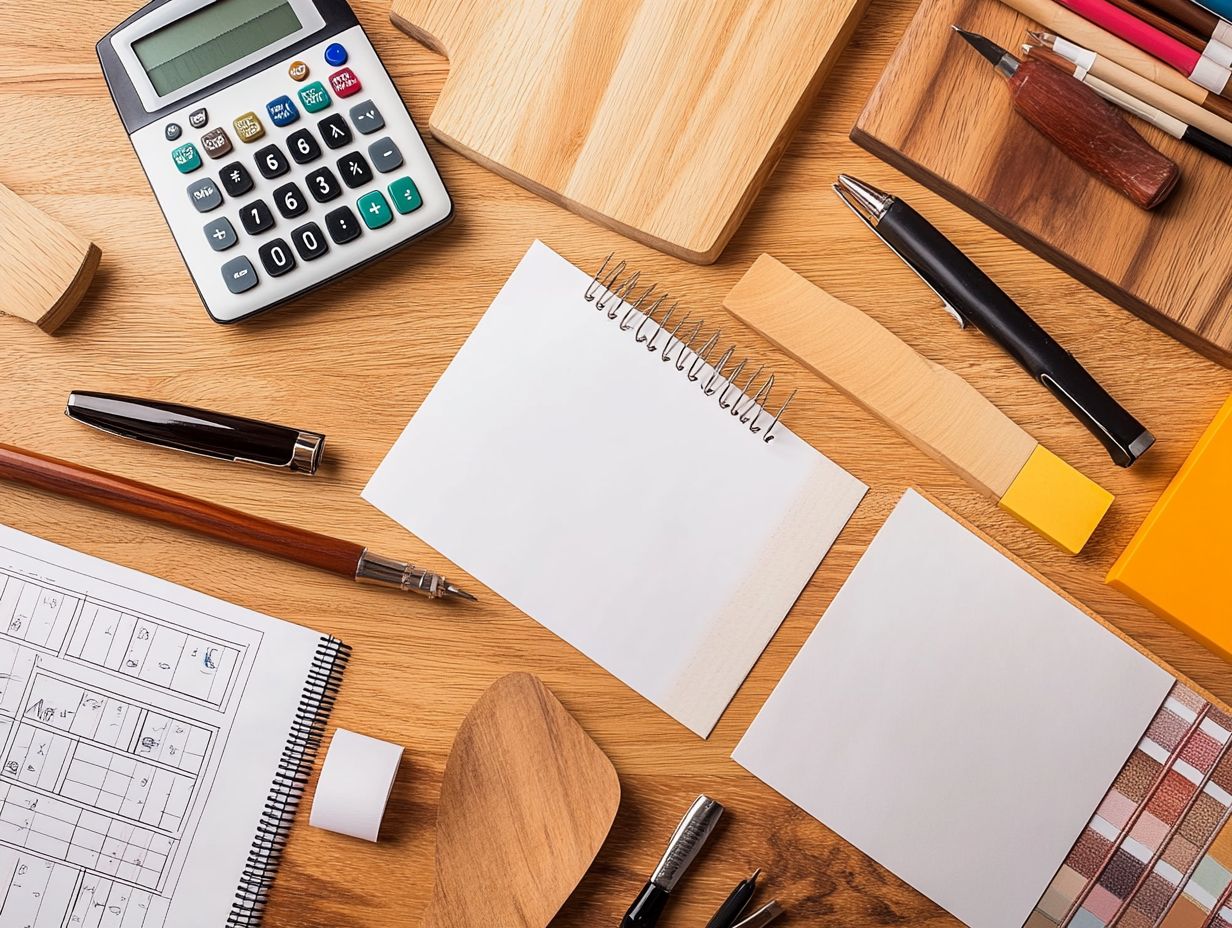
Proper budgeting is key to a successful kitchen design project. Focus on materials, labor, and layout to stretch your budget further. Assess your needs, research prices, and utilize cost-saving strategies.
Master Your Kitchen Design Budget!
Understanding kitchen design budgets is essential for homeowners and designers. It establishes the foundation for a renovation that enhances functionality while respecting your financial limits.
A well-constructed budget considers various factors—design features, materials, and installation costs. This ensures the project aligns with your vision without exceeding your financial plan.
By emphasizing these elements during the planning phase, you can strike a balance between aesthetic appeal and practicality in your kitchen design.
Why Budgeting Matters in Kitchen Design
Budgeting is crucial for ensuring your remodel remains financially viable. It enables informed choices that enhance both functionality and aesthetics.
A well-structured budget serves as your roadmap. It helps you prioritize spending on essential elements like countertops, cabinetry, and modern appliances. This encourages you to explore exciting options without compromising quality!
By establishing clear financial boundaries, you can avoid overspending, which often leads to stress and dissatisfaction. With solid financial guidelines, you can approach each design decision—with confidence, from selecting energy-efficient appliances to choosing the perfect backsplash.
Key Factors to Consider in Budgeting
When budgeting for a kitchen renovation, consider several key factors to ensure a successful project that fulfills both your functional and aesthetic desires.
Account for the costs associated with materials, labor, and the design layout. Each element significantly influences your overall financial plan. Carefully evaluate how your choices impact functionality and installation, as these decisions can directly affect the project’s outcome and your final budget.
Materials and Labor Costs
Understanding the costs of materials and labor is crucial when establishing a budget for your kitchen renovation. These expenses often make up the largest portion of your financial plan.
As you embark on your kitchen overhaul, appreciate the variety of materials available—different types of cabinets, countertops, and flooring options. Each choice influences the overall aesthetic of the space and impacts your budget.
For instance, granite and quartz countertops can vary significantly in price. Similarly, cabinetry quality ranges from stock to custom-made, which can lead to differing labor costs based on the complexity of installation.
When selecting appliances, energy-efficient models may stretch your budget initially, but they save you money on utility bills over time. Prioritizing quality over price ensures greater durability and long-term satisfaction in your kitchen space.
Design and Layout Considerations
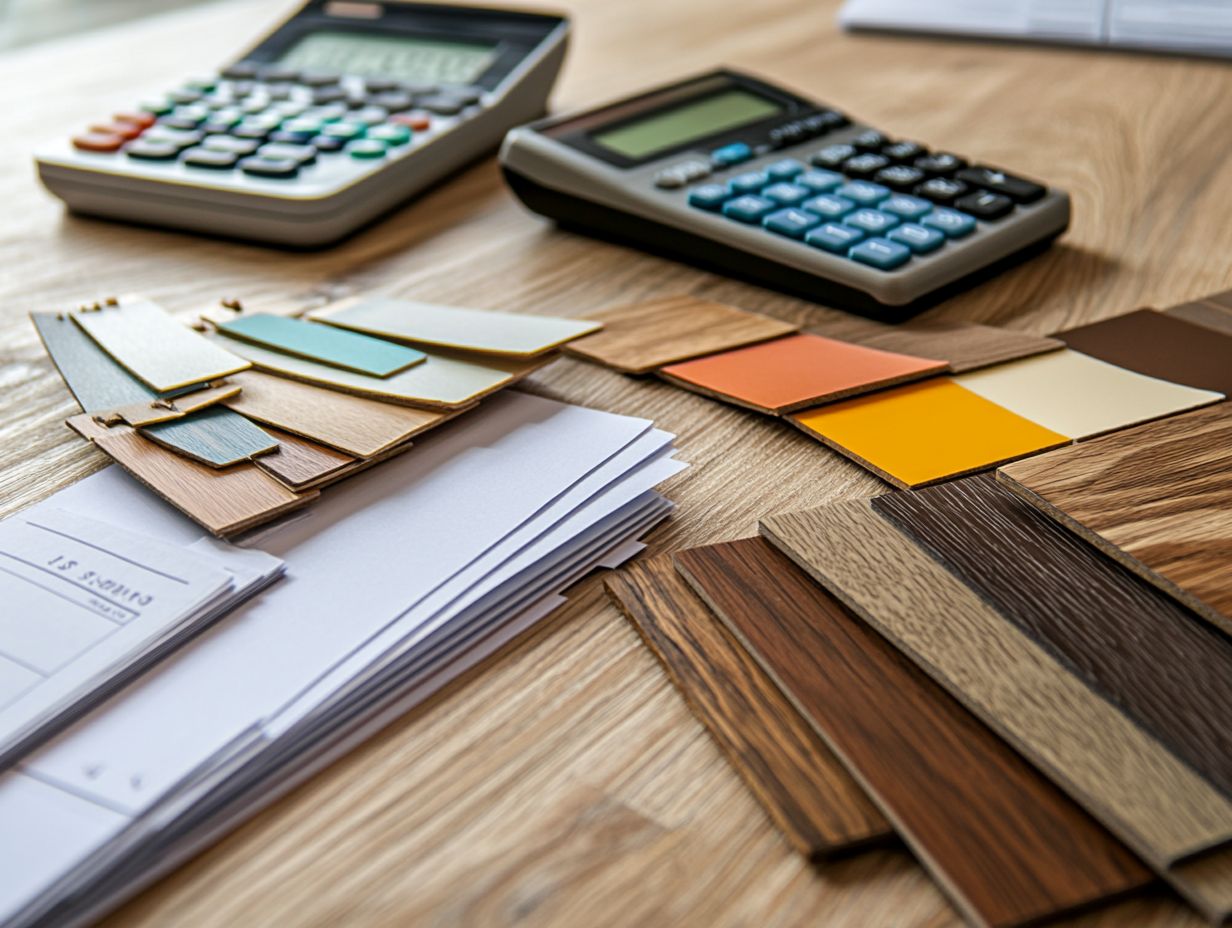
Designing your kitchen is crucial for functionality and budget. Thoughtfully crafted kitchen designs significantly affect how you use the space and your overall costs.
Efficiency in workflow is key. A well-planned kitchen ensures that key areas like the fridge, stove, and sink are conveniently positioned for your convenience. Embracing styles such as contemporary, traditional, or farmhouse can enhance both charm and usability.
If you have limited space, consider layouts like a galley kitchen or L-shaped kitchen. These options create a more open atmosphere and facilitate easier movement.
Incorporating islands or breakfast bars offers additional prep space and encourages social interaction.
Ultimately, focusing on design elements can transform your kitchen into a functional yet visually stunning heart of your home.
Creating a Realistic Budget
To create a realistic kitchen budget, evaluate your needs and desires. Make sure your financial resources are strategically allocated to meet both functional and aesthetic objectives.
Investing time in planning and consulting with designers can help you navigate the details about costs related to materials, installation, and project management.
This approach streamlines the remodeling process and increases your chances of achieving a successful and beautiful transformation.
Assessing Your Needs and Wants
Assessing your needs and wants is essential for establishing a budget for your kitchen remodel. This helps you prioritize elements that enhance both functionality and design.
Identify your must-haves versus nice-to-haves. Essentials include a reliable stove, ample storage, and an efficient layout.
These features facilitate daily cooking and meal prep. On the flip side, your desires might include luxurious upgrades like a double oven or stunning quartz countertops. While these can elevate your space’s visual appeal, they aren’t essential for basic kitchen operations.
Grounding each decision in practicality allows you to create a balanced design that beautifully merges aesthetics with everyday utility.
Researching Prices and Costs
Researching prices and costs is crucial for crafting a realistic budget for your kitchen remodel. Knowing prices helps you choose wisely about materials and appliances.
Use online resources like home improvement websites and renovation calculators to gain insights into average price ranges for cabinets, countertops, and fixtures. Visiting local showrooms offers a tactile experience and the chance to explore the latest trends and styles in person.
Consulting with experienced designers can enhance your understanding of potential costs. They can provide tailored recommendations that align with your budget and aesthetic preferences.
Together, these strategies help you navigate kitchen renovations with greater confidence.
Maximizing Your Budget
Want to stretch your kitchen budget? Use smart tips to maximize every dollar while creating your dream space!
By adopting intelligent cost-saving strategies, you can achieve your desired design without sacrificing functionality or quality.
Cost-Saving Tips and Strategies
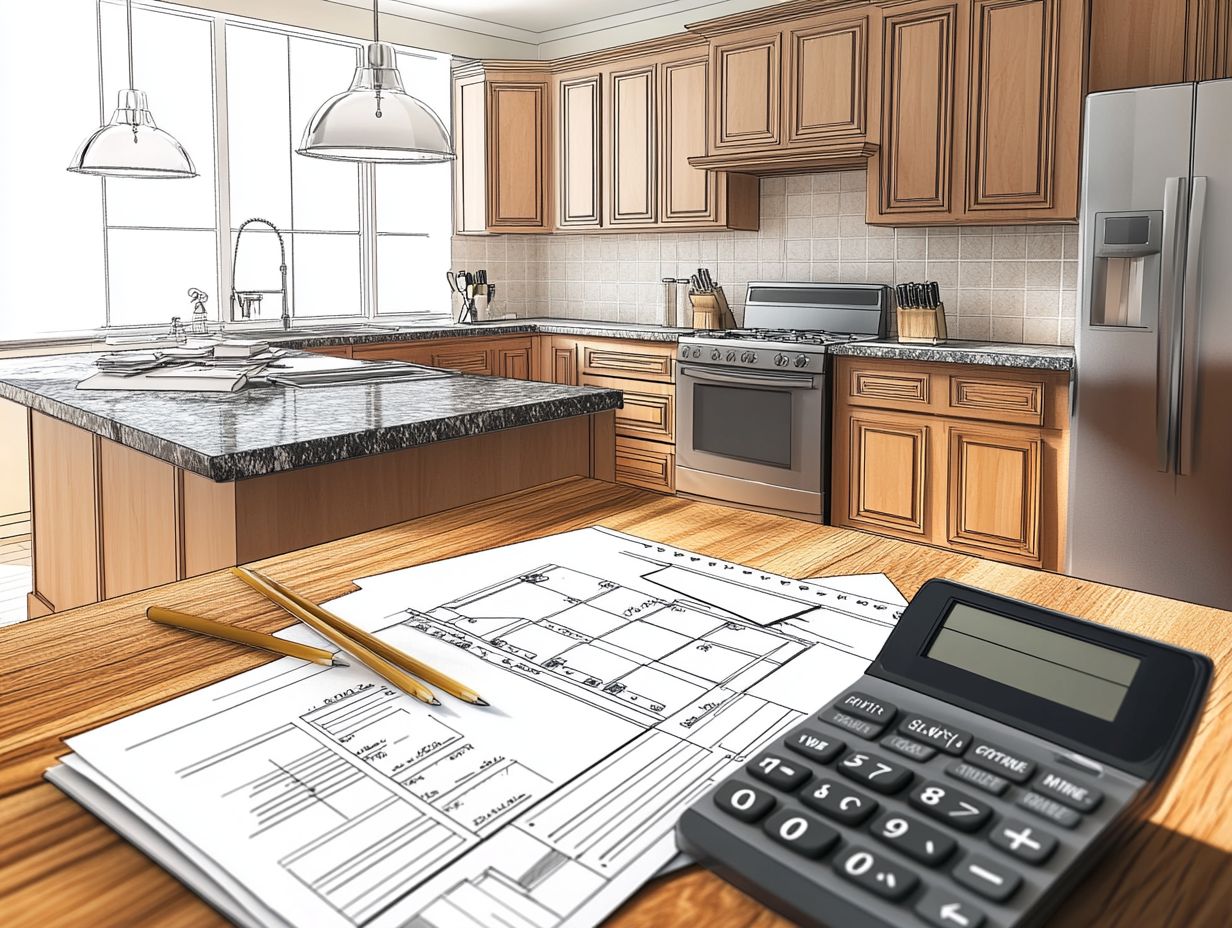
Using cost-saving tips and strategies is crucial for homeowners like you who want to maximize your kitchen remodel budget without sacrificing design or functionality.
Considering some DIY projects can significantly cut down on labor costs while adding your unique touch to the kitchen design. For example, refinishing your cabinets instead of replacing them can save you a lot of money! Opting for open shelving rather than expensive cabinetry can also keep your budget intact.
Exploring alternative materials is another smart move. Choices like laminate countertops or vinyl flooring can give you a similar aesthetic to pricier options without stretching your wallet.
Shopping during seasonal sales or clearance events can help you find great deals on appliances and fixtures. This allows you to upgrade without overspending.
Dealing with Unexpected Expenses
Navigating unexpected expenses during a kitchen remodel can be quite challenging. However, establishing a robust budget and a well-thought-out budget set aside for unexpected costs can significantly reduce stress and keep your project flowing smoothly.
How to Handle Budget Overages
Effectively managing budget overages requires a proactive mindset, enabling you to navigate unexpected expenses while keeping your kitchen remodel project on course.
Reassessing your priorities helps you make informed decisions about where to allocate your remaining funds. For instance, if unexpected plumbing issues crop up, you might need to reallocate funds from less critical features, like decorative elements.
Embracing cost-effective solutions and bulk purchasing can be practical strategies to maintain your budget’s integrity. By focusing on the essential aspects of the remodel and remaining flexible with certain aesthetic choices, you can ensure that the project stays financially manageable while still delivering quality results.
Finalizing Your Budget
Finalizing your budget for a kitchen remodel is an essential part of the planning process. This step ensures that every cost is carefully noted and that you can make adjustments as needed to achieve your desired outcomes.
Revising and Adjusting as Needed
Revising and adjusting your budget as needed is crucial for a successful kitchen remodel, offering you the flexibility to respond to changing circumstances or new insights.
Being adaptable ensures that unexpected expenses do not derail your entire project. For example, kitchen design often reveals hidden structural issues or outdated plumbing that require immediate attention and funding.
By maintaining a contingency fund and regularly reviewing your expenses, you can pivot your plans without overwhelming stress. This financial agility not only gives you peace of mind but also enhances the overall outcome, encouraging you to explore better materials or features that initially might have seemed out of reach.
In the end, adopting a flexible budget can transform your culinary space into one that perfectly balances functional needs with aesthetic aspirations.
Frequently Asked Questions
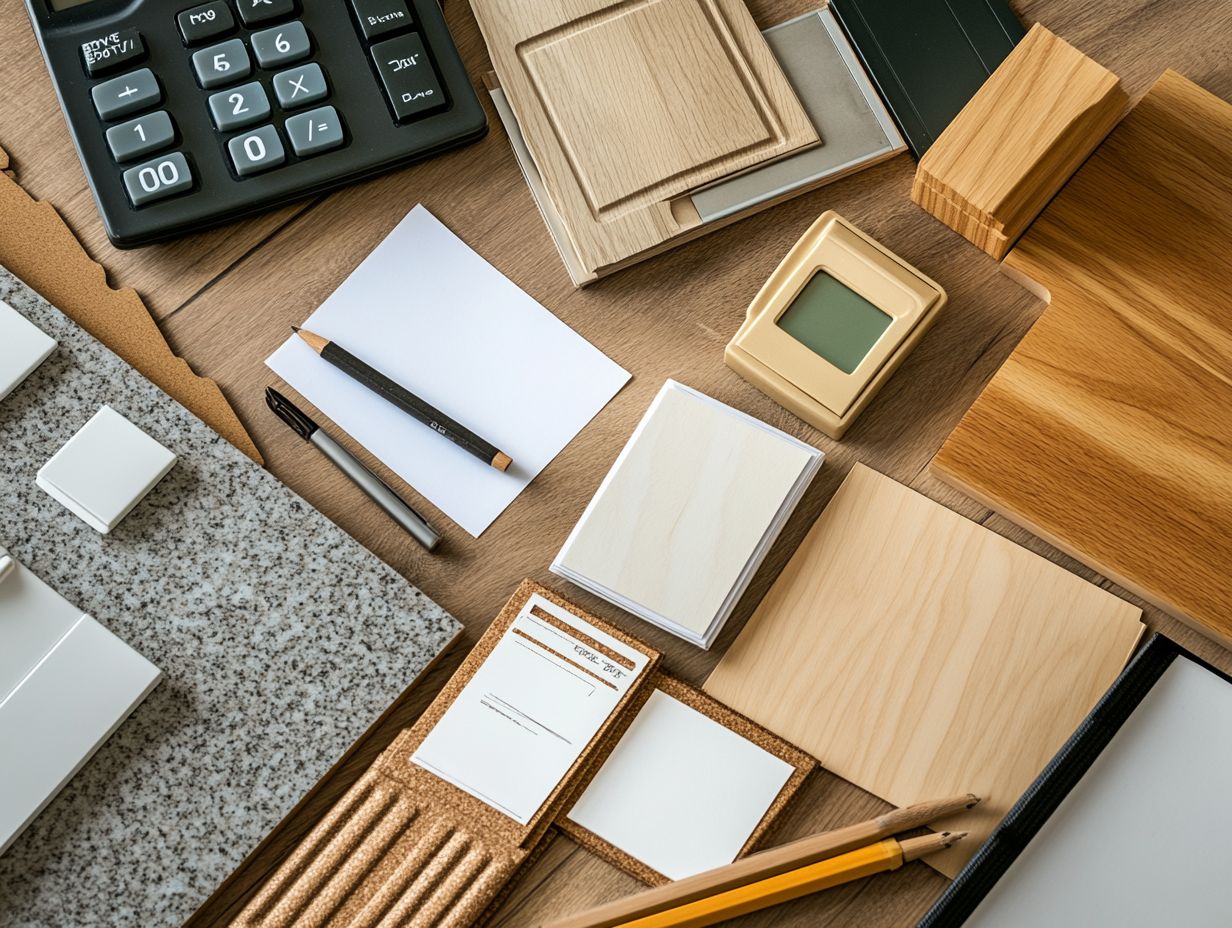
What are the key budgeting essentials for kitchen design projects?
Key essentials include a realistic budget, prioritizing needs, researching costs, preparing for surprises, and tracking spending.
How can I set a realistic budget for my kitchen design project?
To set a realistic budget, determine your overall budget and break it down into categories such as cabinetry, appliances, and labor. Consider the size and layout of your kitchen and any specific design elements you want to include.
Why is it important to prioritize my needs and wants when budgeting for a kitchen design project?
Prioritizing your needs and wants ensures you allocate your budget toward the most essential elements of your kitchen design. This helps you make the most of your budget and avoid overspending on non-essential items.
How can I research the costs of materials and labor for my kitchen design project?
Get quotes from different suppliers and contractors. Check prices for similar projects online.
Talk to a kitchen designer for valuable insights on cost-effective options.
What should I do to account for unexpected expenses in my kitchen design project budget?
Always set aside extra money, around 10-20% of your overall budget. This helps cover surprises like structural issues, delays, or design changes.
How can I track my spending throughout the kitchen design project?
Keep tabs on your spending by recording all expenses, including receipts and invoices. Use budgeting apps or spreadsheets to stay on top of your budget!
